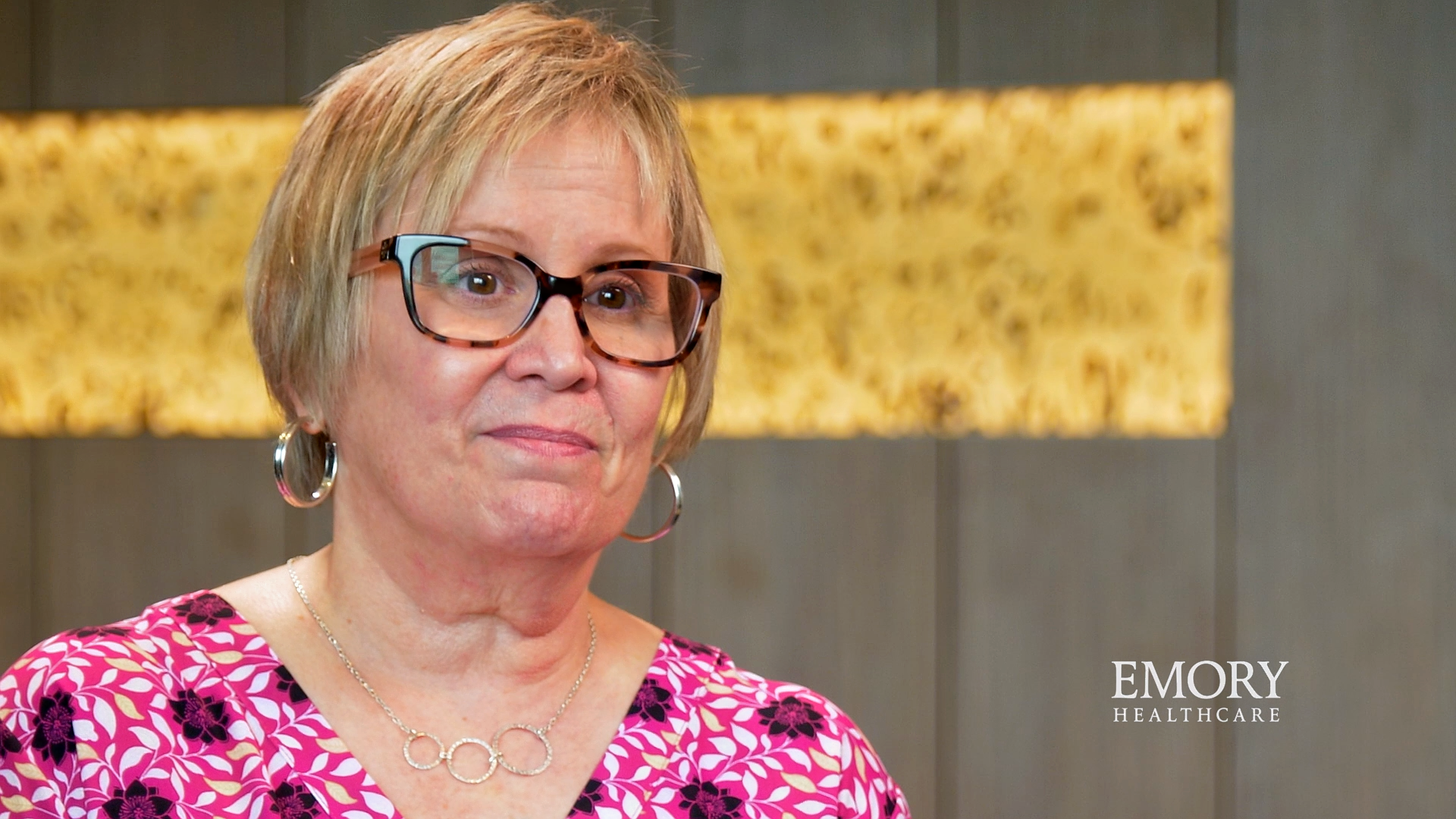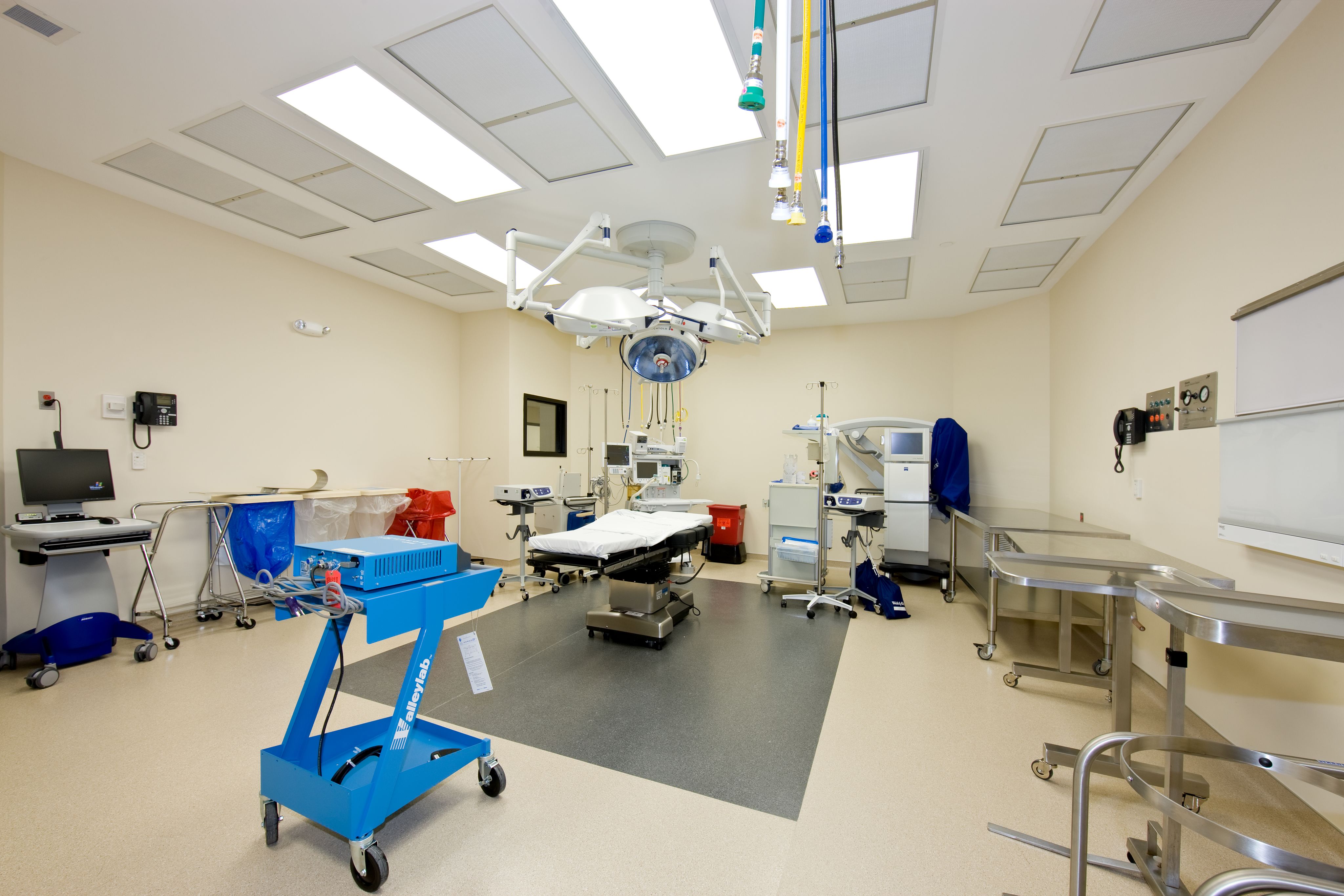Making Carol’s “trailblazing” moments possible with spine surgery
Get it done right the first time with Emory Orthopaedics & Spine Center

Carol, an active nurse and nature lover, spent her free time camping, hiking and biking. But as her spinal condition, a painful disease called spondylolisthesis, began to keep her from enjoying her active life, she knew she had to do something about it. As a nurse and researcher, she knew spine surgery was the only permanent option to return to her active life.
Carol recalls the progressive pain that stopped her active lifestyle. “I noticed that I started having pain down the back of my legs, and then I started getting weak. It happened over probably a year and a half, almost two years. And it got to the point where I knew something was desperately wrong.”
Carol shares her experience finding pain relief from spondylolisthesis through spine surgery with the orthopedic experts at Emory Healthcare.
Carol shares her experience finding pain relief from spondylolisthesis through spine surgery with the orthopedic experts at Emory Healthcare.
Surgery can help spondylolisthesis and other spine conditions
Doctors eventually diagnosed Carol with spondylolistheses, a painful condition where bones in the spine, called vertebrae, slip forward. To find relief for her pain, Carol used her medical research skills to investigate where to get expert care. To her surprise and relief, she found excellent, world-renowned care just a short drive away at Emory Orthopaedics & Spine Center.
She initially worked with Emory's physical therapy team to strengthen her core muscles, providing some relief. Scott D. Boden, MD, director of Emory Orthopaedics & Spine Center, explains. “When it comes to musculoskeletal care, it's important to get the right diagnosis and to exhaust non-operative treatments. But rehabilitation and physical and occupational therapy are a big component of returning to a normal level of function – for all patients, not just those who need surgery.”
Treatment for Spondylolisthesis
Spondylolisthesis impacts about 4-6% of adults. Weight loss and physical therapy can improve symptoms, but surgery is an option when these changes don't provide enough relief. Spinal fusion is the most common surgical procedure for spondylolisthesis, with approximately 500,000 spinal fusion surgeries done each year in the United States.
Finding the best place for spine surgery
Like many patients facing a serious condition and major surgery, Carol had questions.
“What should I do?” she asked herself. “Who should I work with? Where should I go?” As a nurse, she knew how important it was to find a team actively working to advance the treatment of spine conditions like hers.
After some investigation, she says, “It was clear that he and his colleagues at Emory are leading the nation in their research.”
Carol came to her first appointment prepared to discuss her experience and goals and to get answers to questions. Despite a career in medicine, she was a little nervous. But her experience with Dr. Boden and the care team made her feel reassured.
Carol mentions, “I never felt rushed. I felt like he wanted to hear my story.”



And at the end of her visit, Dr. Boden said the words Carol had hoped for:
“I think we can help you.”

Access to innovative care
At Emory Healthcare, patients like Carol benefit from an academic medical center with innovative care based on the latest evidence and clinical research. We are Georgia's most comprehensive academic health system, providing specialized care before it's available at many other hospitals. Our spine specialists strive to create new approaches to treatment so that patients can receive improved care and find relief from back pain and other spine problems.
Dr. Boden says, “Our research team was one of key centers in the United States helping to develop the bone growth factor that accelerated bone healing and was successfully approved by the FDA in 2002.”
Scott Boden, MD, discusses Emory Healthcare's involvement in developing an innovative bone growth factor that helped Carol.
Scott Boden, MD, discusses Emory Healthcare's involvement in developing an innovative bone growth factor that helped Carol.
The team at Emory Orthopaedics & Spine Center has grown over time. Dr. Boden reflects on how the team and approach have evolved and their contribution to pivotal research. “When I came, the department had around 15 physicians, and now we're over a hundred. One of the unique things we've developed over the years is not just a team of surgeons, but a fully integrated team of all the different types of physicians who work seamlessly together care for patients with musculoskeletal problems involving the bones, joints, cartilage, muscle and nerves.”

The timeline of surgery
After Carol exhausted non-surgical treatment options, she worked with Dr. Boden and his team to develop a plan for surgery. When her surgery date was scheduled, she transitioned from searching for answers to preparing for the procedure. Like many patients, Carol was relieved to move forward. “Once they scheduled the surgery, it's interesting. It's almost like you're preparing for a race or an Olympic event but in a good way. I think there's a huge relief,” Carol says.
Dr. Boden and his team explained what they would be doing during surgery and how Carol could prepare for recovery after the procedure. The team fitted Carol with a custom back brace to restrict her movement after surgery and reduce the risk of complications. She then had a pre-anesthesia visit with a nurse practitioner who reviewed her medical history thoroughly. The nurse noted Carol’s sleep apnea and assured her they would closely monitor her breathing throughout the procedure. Even as a nurse, Carol found this discussion the most comprehensive medical visit she'd ever had.
Carol recalls her satisfaction with the pre-operative care. “Every little detail was taken care of. And I can't tell you how reassuring that was. Even before that surgery, the whole process of getting me ready was awe-inspiring. It was another ‘wow’ moment. They had a plan for every little detail, and it would be handled.”
Surgery day for Carol
After weeks of laying the groundwork, the time came for Carol to start feeling better. She recalls the day of her surgery and how the team at Emory performed like a well-oiled machine. Despite her nerves, she took comfort in the time everyone took to explain who they were and their job on the team.
“Everyone knew their role; everyone knew what to do. And they were all so kind, so generous with their time.” Carol says.
After the Emory Orthopaedics & Spine Center care team completed Carol's surgery, she woke up and received reassurance from her husband, her surgeon, and the whole team that her procedure went well. Upon waking, she recalls thinking, “Wow, my legs aren't hurting. My hip's not hurting. That shooting sharp pain is no longer there.”
Carol was on the road to recovery.
While hard work was ahead, she celebrated the first victory of getting through the surgery and being pain-free.

Dedicated to Providing the Best Care Possible

Specialized Care
Carol's surgery was performed at Emory University Orthopaedics & Spine Hospital, the first and only hospital in Georgia exclusively specializing in spine surgery and joint replacement surgery.
A Team Approach
"It was like you were on the flight deck of an aircraft carrier," Carol says, describing the Emory Healthcare team's precise coordination on the day of her surgery.
“Everyone knew their role; everyone knew what to do. And they were all so kind, so generous with their time.”

Better Outcomes
Emory Orthopaedics & Spine Center has among the highest patient satisfaction and best outcome rates in the nation* for your surgery. By using advanced research techniques developed by our top surgeons, we can make sure your surgery is done right the first time.
*Results based on an average of 86% patient satisfaction rating compared to a national benchmark of similar facilities at 68%. Infection rates averages at .45% for primary hip and knee procedures compared to .58% nationally.
After surgery, the healing begins
Carol's recovery started before she even left the hospital. While she wouldn't begin intense physical therapy until several months after her procedure, her initial treatment included support for tasks that most people take for granted – rolling over in bed, getting out of bed and even walking. During the first six months, she followed her post-surgery recommendations, avoiding bending at the waist, twisting, and heavy lifting. However, she was walking within the first days after surgery, and driving several weeks later. When she was ready, about a year later, she started physical therapy to build her strength. Carol's team wanted to restrict her movement so her bones would heal and grow stronger. In the interim, Carol was at home and work, returning to her routine as she regained mobility and strength.
Carol took advantage of telehealth appointments for follow-up appointments that didn't require a physical exam. She appreciated the convenience of virtual appointments. “I didn't have to pack my things in the car or leave work. That was a wonderful convenience,” she says.


The future is bright after surgery
The therapy team worked with Carol to allow her to do her job as a nurse and get back to her hobbies – hiking, biking and camping. Exactly a year and three days after Carol's surgery, she was hiking in a national park in Iceland. She planned a celebratory trip with her husband and friends to mark the start of a new chapter.
“I was on a hiking trail in this magnificently beautiful part of the world with waterfalls surrounding me, walking on lava. And to have no pain. It's even better than before because I appreciate it so much now. I don't take it for granted — getting out, riding a bike, walking around the neighborhood, and walking to the high school for an event. The appreciation I have makes it all sweeter.”
Moving pain-free in a national park when just a year earlier, she wouldn't have even dreamed of such a trip was life-changing. “I can't even tell you how that moment felt. It was like my life started again,” she says.
Dr. Boden is equally pleased with Carol's progress. “Carol's recovery has been fantastic. She's been a model patient, and she recovered extremely well. Now she's back to normal life and doing all activities without limitations or restrictions.”
"I have no pain," says Carol.
"I have no pain," says Carol.

Exactly a year and three days after Carol's surgery, she was hiking in a National Park in Iceland.
Exactly a year and three days after Carol's surgery, she was hiking in a National Park in Iceland.

Exactly a year and three days after Carol's surgery, she was hiking in a National Park in Iceland.
Exactly a year and three days after Carol's surgery, she was hiking in a National Park in Iceland.

Carol's hobbies also include pottery.
Carol's hobbies also include pottery.
Choose the experts at Emory Healthcare for your spine care
With the help of the team at Emory Orthopaedics & Spine Center, Carol's research and hard work preparing for and recovering from surgery paid off. While Carol's story is unique, she is not alone searching for a pain-free life. If you are suffering from a spine condition, our Emory Orthopaedics & Spine Center experts can help get it done right the first time.
Writer Lindsay Malone; designer Laura Kuechenmeister;
videographers Mixed Bag Media




